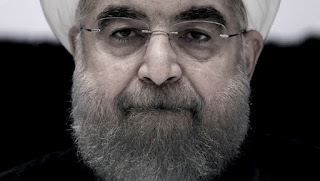Analysis by PMOI/MEK
PMOI, April 27, 2018 - The three day visit by French President Emmanuel Macron to the U.S. and his talks with his American counterpart Donald Trump came to an end after mainly focusing on the Iran nuclear agreement and how to resolve the existing crisis of Washington threatening to abandon ship on the accord.

The result of this visit has been the subject of a variety of analysis from different viewpoints. Foreign outlets and state media in Iran are running the same line of thought. The end result is that one cannot come to a firm conclusion about the outcome of Macron’s talks with Trump, and how will the U.S. President decide come his May 12
th deadline.
No official statement or newsletter has been published as of yet, otherwise we would not be witness to such a conglomerate of perspectives. Trump is always answering with terms such as, “You will see” or everything will be resolved May 12th.
Reactions from inside Iran are also derived from different standpoints. Tehran first expected Europe to place small and hardly meaningful concessions before Trump, in a tactic similar to the Obama years, all aimed at bringing calm to the U.S. administration’s demands. Developments, however, show that Europe’s suggestions are quite serious and there is word of Iran giving up its ballistic missile program and Middle East influence.
Iranian President Hassan Rouhani, in a recent speech in Tabriz, resorted to brouhaha and even mocked the U.S. President. These remarks have the potential of backfiring and we cannot come to a final understanding what Iran may have actually received, if anything in fact, from the Trump-Macron talks.
Rouhani’s remarks can lead us to a conclusion that Iran will abandon the JCPOA if the U.S. takes such measures. It goes without a doubt that Tehran is terrified of Trump’s possible decision to exit the JCPOA. Iran attempted to signal its willingness to provide encouraging concessions, including the release of American hostages imprisoned in Iran.
Although why do the U.S. and Europe on one hand, and Iran on the other, refuse to specifically describe the status quo and what their final decision may be?
As far as Tehran is concerned, it is forced to choose between bad and worse. Considering the fact that there are no grounds for a deal with the U.S., Rouhani’s remarks are very cautions and paving the path to thus claim of a win-win end result being out of the question for Iran.
The U.S. and Europe are not willing to show their hands, thus increasing the pressure on Iran’s regime. This comes as their announced intentions are aimed at increasing pressure on Tehran, knowing this limbo status will render major crises amongst the regime’s ranks and files, placing it before an unknown future. These pressures are set to further increase after May 12th.
Of course, in his last remarks Macron said it appears Trump has no interest to remain in the JCPOA. He did, however, emphasize the fact that this is his personal opinion and provided no final result of his talks with Trump.
One can imagine that this is also part of the same pressure strategy to send a message to the Iranian regime that the road ahead will be very slippery and full of unknowns.
Tehran is now placing its hopes on German Chancellor Angela Merkel’s Friday visit to Washington. It is, however, safe to say that Macron discussed his game plan with his European partners prior to his Washington visit and that he enjoys the best relationship with Trump among all of Europe’s leaders.
If he couldn’t convince Trump, does Merkel stand a chance? Or anyone else for that matter?




Comments
Post a Comment